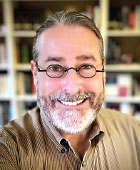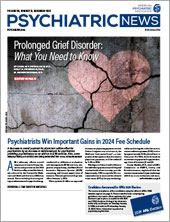At a conference I recently directed on the integration of psychodynamic and psychosocial frameworks with mainstream biomedical approaches, one of the most challenging questions I was asked came from an early career psychiatrist (ECP). This young psychiatrist was seeking advice on what to do in the face of her employer’s demand to “practice at the top of the license.” The implication in this case was that “you are medically trained, while others are not, so your energies should be devoted exclusively to providing medicine.” In the face of such pressures, this psychiatrist wondered, might psychiatrists find ways to incorporate their psychotherapeutic skill sets into their work?
The concept of practicing at the top of one’s license has been backed up by APA and inscribed at the heart of the
Collaborative Care Model.
My admittedly cynical suspicion is that the aforementioned employers may, at least in part, be using the phrase “practicing at the top of your license” to guilt or shame those ECPs who want to do psychotherapy into providing the kind of treatment that maximizes income for their employers (and, less cynically, also allows them to see as many people in need as possible). These employers may equate the “top of the license” with top billables, which is one of the ways that the reimbursement tail may be wagging the clinical dog.
I have to say that I agree, in principle, with this resident’s employer that it is important for psychiatrists to be practicing at the top of their license. I disagree profoundly, however, with that narrow notion of what it means to practice at the top of the psychiatric license. Regarding the prescription of psychiatric medications, it is arguable that nonpsychiatrist prescribers without specific training in psychotherapy (that is, psychiatric midlevel clinicians) might be practicing at the top of their license in focusing primarily on the clinical task of prescribing medications.
Psychiatrists, in contrast, all receive training to the level of “competence” in mainstream psychotherapies. In practice, this means well over a thousand hours of psychotherapy didactics, supervision, and supervised practice. One key factor that sets psychiatrists apart from primary care providers, psychiatric nurse practitioners, and psychiatric physician assistants on the one hand and from psychologists (in most states) on the other is that psychiatrists have been trained extensively in both psychotherapy and pharmacotherapy and in the integration of the two modalities. This, to me, is clearly the top of the psychiatric license: to know how to integrate psychotherapy and medications in ways that enhance outcomes and to know which patients are most likely to benefit from combined treatment.
The ECP who posed this question, and not so much her employer, seemed to be the one committed to practicing at the top of the license. She recognized that many patients are unable to benefit from medications alone due to the complex nature of their troubles, often in the context of disturbed relationships with medications, with treatment, with caregiving, or with health itself. In this era when pharmacologic treatment resistance is increasingly recognized as a tremendous clinical problem, such biopsychosocially trained psychiatrists recognize that, for a great many patients, psychiatry is most effective when it is able to combine psychotherapeutic skills with pharmacotherapy.
In addition, integrating psychotherapeutic skills and perspectives does not mean that psychiatrists are limited to providing combined treatment in 50-minute sessions. Rather, there are ways that psychiatrists can use those psychotherapeutic sensibilities and skills in the course of routine practice to enhance outcomes. Integrating those skills can allow us to practice what Michael Balint (who gave us the concept of “patient-centredness”) called “
six-minute psychotherapy” that involves addressing psychological and interpersonal factors contributing to treatment resistance.
Motivational interviewing and psychodynamic psychopharmacology are two examples guiding such six-minute psychotherapy.
Similarly, there are different ways that psychiatrists practicing in collaborative care settings may inhabit the role of consulting psychiatrist to truly practice at the top of their license. In some cases, it may be adequate simply to offer recommendations about what to prescribe. However, given what we know about the profound effects of psychological and interpersonal factors on pharmacotherapy outcomes, psychotherapeutically informed psychiatrists practicing at the top of their license may be empowered also to make recommendations about
how to prescribe to achieve optimal outcomes.
For example, a psychiatrist consults to primary care regarding a young man with recurrent suicidal depression and a history of nonadherence. The psychiatrist may go further than recommending an antidepressant. With an understanding that the patient’s transference to care (or relational schemas) equates caregiving authority with the patient’s authoritarian father, the psychiatrist may also suggest that this young man will particularly need to be offered choices so as not to feel forced, making
the evidence-based recommendation to involve the patient in shared decision-making, with the likelihood of enhancing future adherence.
So, in response to the young psychiatrist who posed the question at the beginning of this article, I suggested that she embrace the demand to work at the top of her license and, in fact, to insist on it, pushing back, however, against the narrow, cynical, and unproven idea that the top of our license involves throwing away half our training and half our skills. I hope we all can do this. ■
Resources
Mintz D. Psychodynamic Psychopharmacology: Caring for the Treatment-Resistant Patient. APA Publishing, 2022.
Mintz DL, Flynn DF. How (Not What) to Prescribe: Nonpharmacologic Aspects of Psychopharmacology. Psychiatr Clin North Am. 2012. 35(1): 143-163.
Miller WR, Rollnick S. (2012). Motivational interviewing: Helping people change. Guilford press, 2012.
Weinberg E, Mintz D. The Overall Diagnosis: Psychodynamic Psychiatry, Six-Minute Psychotherapy, and Patient-Centered Care. Psychiatr Clin North Am. 2018; 41(2): 263-275.
Woolley S, Fredman L, Goethe JW, Lincoln AK, Heeren T. Hospital Patients’ Perceptions During Treatment and Early Discontinuation of Serotonin Selective Reuptake Inhibitor Antidepressants. J Clin Psychopharmacol. 2010; 30(6): 716-719.

